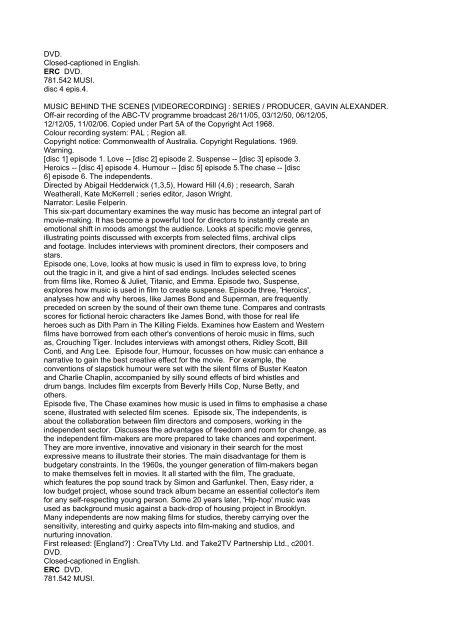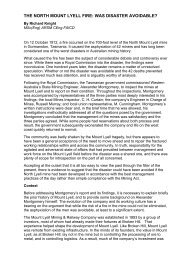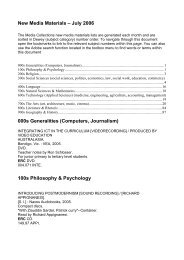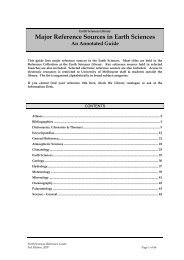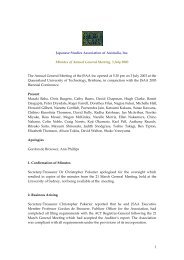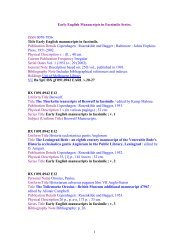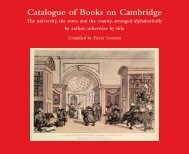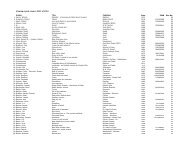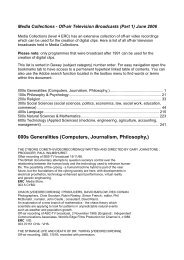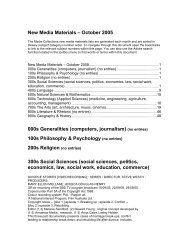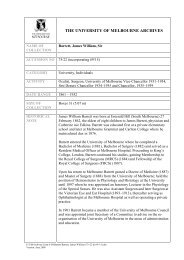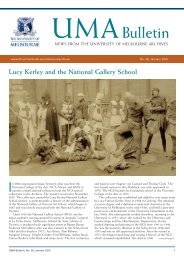Media Collections - Off-air Television Broadcasts - The University of ...
Media Collections - Off-air Television Broadcasts - The University of ...
Media Collections - Off-air Television Broadcasts - The University of ...
Create successful ePaper yourself
Turn your PDF publications into a flip-book with our unique Google optimized e-Paper software.
DVD.<br />
Closed-captioned in English.<br />
ERC DVD.<br />
781.542 MUSI.<br />
disc 4 epis.4.<br />
MUSIC BEHIND THE SCENES [VIDEORECORDING] : SERIES / PRODUCER, GAVIN ALEXANDER.<br />
<strong>Off</strong>-<strong>air</strong> recording <strong>of</strong> the ABC-TV programme broadcast 26/11/05, 03/12/50, 06/12/05,<br />
12/12/05, 11/02/06. Copied under Part 5A <strong>of</strong> the Copyright Act 1968.<br />
Colour recording system: PAL ; Region all.<br />
Copyright notice: Commonwealth <strong>of</strong> Australia. Copyright Regulations. 1969.<br />
Warning.<br />
[disc 1] episode 1. Love -- [disc 2] episode 2. Suspense -- [disc 3] episode 3.<br />
Heroics -- [disc 4] episode 4. Humour -- [disc 5] episode 5.<strong>The</strong> chase -- [disc<br />
6] episode 6. <strong>The</strong> independents.<br />
Directed by Abigail Hedderwick (1,3,5), Howard Hill (4,6) ; research, Sarah<br />
Weatherall, Kate McKerrell ; series editor, Jason Wright.<br />
Narrator: Leslie Felperin.<br />
This six-part documentary examines the way music has become an integral part <strong>of</strong><br />
movie-making. It has become a powerful tool for directors to instantly create an<br />
emotional shift in moods amongst the audience. Looks at specific movie genres,<br />
illustrating points discussed with excerpts from selected films, archival clips<br />
and footage. Includes interviews with prominent directors, their composers and<br />
stars.<br />
Episode one, Love, looks at how music is used in film to express love, to bring<br />
out the tragic in it, and give a hint <strong>of</strong> sad endings. Includes selected scenes<br />
from films like, Romeo & Juliet, Titanic, and Emma. Episode two, Suspense,<br />
explores how music is used in film to create suspense. Episode three, 'Heroics',<br />
analyses how and why heroes, like James Bond and Superman, are frequently<br />
preceded on screen by the sound <strong>of</strong> their own theme tune. Compares and contrasts<br />
scores for fictional heroic characters like James Bond, with those for real life<br />
heroes such as Dith Parn in <strong>The</strong> Killing Fields. Examines how Eastern and Western<br />
films have borrowed from each other's conventions <strong>of</strong> heroic music in films, such<br />
as, Crouching Tiger. Includes interviews with amongst others, Ridley Scott, Bill<br />
Conti, and Ang Lee. Episode four, Humour, focusses on how music can enhance a<br />
narrative to gain the best creative effect for the movie. For example, the<br />
conventions <strong>of</strong> slapstick humour were set with the silent films <strong>of</strong> Buster Keaton<br />
and Charlie Chaplin, accompanied by silly sound effects <strong>of</strong> bird whistles and<br />
drum bangs. Includes film excerpts from Beverly Hills Cop, Nurse Betty, and<br />
others.<br />
Episode five, <strong>The</strong> Chase examines how music is used in films to emphasise a chase<br />
scene, illustrated with selected film scenes. Episode six, <strong>The</strong> independents, is<br />
about the collaboration between film directors and composers, working in the<br />
independent sector. Discusses the advantages <strong>of</strong> freedom and room for change, as<br />
the independent film-makers are more prepared to take chances and experiment.<br />
<strong>The</strong>y are more inventive, innovative and visionary in their search for the most<br />
expressive means to illustrate their stories. <strong>The</strong> main disadvantage for them is<br />
budgetary constraints. In the 1960s, the younger generation <strong>of</strong> film-makers began<br />
to make themselves felt in movies. It all started with the film, <strong>The</strong> graduate,<br />
which features the pop sound track by Simon and Garfunkel. <strong>The</strong>n, Easy rider, a<br />
low budget project, whose sound track album became an essential collector's item<br />
for any self-respecting young person. Some 20 years later, 'Hip-hop' music was<br />
used as background music against a back-drop <strong>of</strong> housing project in Brooklyn.<br />
Many independents are now making films for studios, thereby carrying over the<br />
sensitivity, interesting and quirky aspects into film-making and studios, and<br />
nurturing innovation.<br />
First released: [England?] : CreaTVty Ltd. and Take2TV Partnership Ltd., c2001.<br />
DVD.<br />
Closed-captioned in English.<br />
ERC DVD.<br />
781.542 MUSI.


